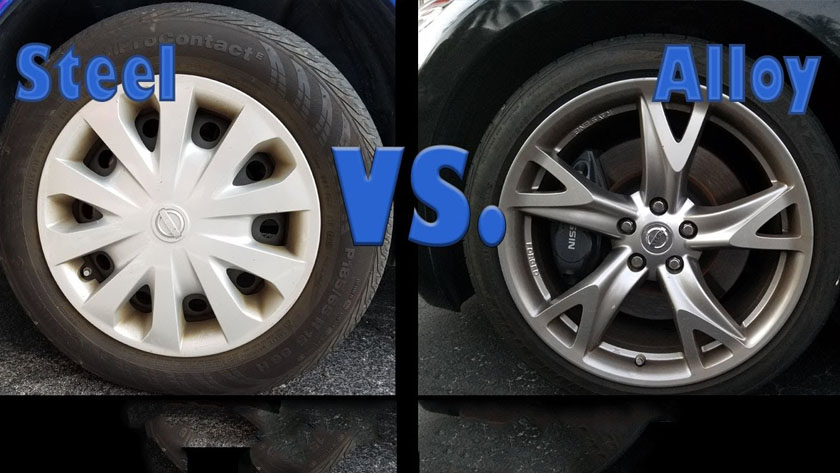Alloy Wheels Vs Steel Wheels | Which Best and Why?
When it comes to choosing the right wheels for your vehicle, you often face the decision between alloy wheels and steel wheels. Both options have their own set of advantages and disadvantages. In this section, we will explore what alloy wheels and steel wheels are, and weigh their pros and cons to help you make an informed decision.
What are alloy wheels?
Alloy wheels are made from a combination of metals, typically aluminum or magnesium. This combination results in a wheel that is stronger and lighter than its steel counterpart. The lighter weight of alloy wheels can improve acceleration, handling, and fuel efficiency. Additionally, alloy wheels are known for their aesthetic appeal as they can be designed in various styles and finishes, enhancing the overall appearance of your vehicle.
What are steel wheels?
On the other hand, steel wheels are made entirely of steel. They are known for their durability and ability to withstand harsh conditions and heavy loads. Steel wheels are often the preferred choice for utility vehicles and trucks due to their strength and cost-effectiveness. While they may not offer the same level of aesthetic appeal as alloy wheels, steel wheels are widely recognized for their functionality and ability to handle rough terrains.
When deciding between alloy wheels and steel wheels, it is essential to consider your specific needs and preferences. If you prioritize performance and style, alloy wheels might be the better option for you. However, if you require durability and affordability, steel wheels might be the more practical choice. Ultimately, the decision should be based on your driving requirements and budget.
In the next section, we will delve deeper into the pros and cons of alloy wheels and steel wheels, allowing you to further understand the differences between the two and make an informed decision for your vehicle.

Advantages of Alloy Wheels
When it comes to choosing the right wheels for your vehicle, alloy wheels offer a range of advantages over their steel counterparts. In this section, we will delve into the benefits of alloy wheels and why they may be the better choice for your vehicle.
Improved Performance
One of the major advantages of alloy wheels is their ability to improve the performance of your vehicle. Due to their lighter weight compared to steel wheels, alloy wheels enhance acceleration and handling. The reduced unsprung weight allows for quicker response and better maneuverability on the road. This can greatly enhance your driving experience, especially on winding roads or during sharp turns.
Additionally, alloy wheels provide better heat conduction, which helps in dissipating heat more efficiently. This is particularly beneficial for high-performance vehicles or when driving in hot weather conditions. By maintaining optimal operating temperatures, alloy wheels minimize the risk of brake fade and ensure smoother braking performance.
Better Aesthetics
Another significant advantage of alloy wheels is their aesthetic appeal. Alloy wheels come in a variety of styles, designs, and finishes, allowing you to personalize the look of your vehicle. Whether you prefer a classic, sporty, or modern look, alloy wheels offer endless options to suit your taste. The sleek and polished appearance of alloy wheels can instantly enhance the overall aesthetics of your vehicle, giving it a more attractive and luxurious appearance.
Furthermore, alloy wheels are usually available in larger sizes compared to steel wheels. This larger size makes room for larger brake kits for improved braking performance. The visually appealing combination of larger alloy wheels and larger brake kits can not only enhance the appearance of your vehicle but also provide better stopping power.
So, alloy wheels offer several advantages over steel wheels, including improved performance and better aesthetics. Their lighter weight improves acceleration and handling, while their wide range of designs allows for customization and enhances the overall appearance of your vehicle. When it comes to selecting the perfect wheels for your vehicle, alloy wheels provide a winning combination of style and performance.
Disadvantages of Alloy Wheels
Higher Cost
One of the main disadvantages of alloy wheels is that they tend to be more expensive compared to their steel counterparts. The manufacturing process involved in creating alloy wheels using materials such as aluminum or magnesium alloys is more complex and requires higher precision. These additional costs are often passed on to the consumer, making alloy wheels a pricier option.
Furthermore, if you ever need to repair or replace an alloy wheel due to damage, it can be a costly endeavor. The specialized tools and expertise required for repairing alloy wheels can add to the overall expenses. On the other hand, steel wheels are generally more affordable and easier to repair or replace.
Prone to Damage
While alloy wheels may enhance the look and performance of your vehicle, they are also more susceptible to damage compared to steel wheels. Alloy wheels are more lightweight and therefore less durable when it comes to handling impacts and rough terrains. They are more prone to bending, cracking, and even breaking under excessive pressure or when driving over potholes.
Additionally, alloy wheels are more susceptible to corrosion, especially in areas with harsh weather conditions or where road salt is used. This could lead to the development of rust or other forms of damage, compromising both the aesthetics and structural integrity of the wheels.
It is also worth noting that alloy wheels require more frequent maintenance and care to prevent damage. Regular cleaning and polishing are necessary to protect the wheels from brake dust, dirt, and other contaminants that can corrode the surface over time.
So, while alloy wheels offer improved performance and aesthetic appeal, they come with a higher price tag and are more prone to damage compared to steel wheels. The decision between alloy wheels and steel wheels ultimately depends on your budget, driving conditions, and personal preferences. Considering both the advantages and disadvantages can help you make an informed choice when selecting the most suitable wheels for
Advantages of Steel Wheels
When it comes to choosing between alloy wheels and steel wheels, there are several advantages to consider when opting for steel. Steel wheels have long been a popular choice for many vehicle owners, and here’s why.
Durability
One of the key advantages of steel wheels is their durability. Steel is known for its strength and resilience, making steel wheels highly resistant to damage and deformation. They are less likely to bend, crack, or break under normal driving conditions, even when faced with potholes, curbs, or rough terrains. This durability ensures that steel wheels can withstand the ups and downs of everyday driving, providing you with a reliable and long-lasting option.
In addition, steel wheels are less prone to corrosion compared to alloy wheels. Their solid construction and protective paint coatings make them better equipped to resist the effects of rust and harsh weather conditions. This means that steel wheels can retain their appearance and structural integrity for a longer period, requiring less maintenance and potential repair costs.
Affordability
Another advantage of steel wheels is their affordability. Compared to alloy wheels, steel wheels are generally more budget-friendly due to their simpler manufacturing process and lower material cost. This makes them a cost-effective option, especially for those who are looking for practicality and functionality without breaking the bank.
Additionally, in case of damage or the need for replacement, steel wheels are easier and cheaper to repair or replace. Unlike alloy wheels which may require specialized tools and expertise, steel wheels can often be fixed using standard equipment and techniques. This accessibility to repairs or replacements further adds to the overall value of steel wheels.
So, steel wheels offer distinct advantages that make them a desirable option for many vehicle owners. Their durability and resistance to damage, along with their affordability and ease of repair, make them a practical and cost-effective choice. When considering your options for wheels, it’s important to assess your driving needs, budget, and personal preferences to make an informed decision. Regardless of your choice, maintaining regular care and maintenance will ensure the longevity and optimal performance
:max_bytes(150000):strip_icc()/AlloyVSsteel-58b1f12d3df78cdcd82e58fd.jpg)
Disadvantages of Steel Wheels
Heavier Weight
One of the main disadvantages of steel wheels is their heavier weight compared to alloy wheels. Steel wheels are typically made of solid steel, which adds to their overall mass. This extra weight can have several implications for your vehicle’s performance and fuel efficiency.
The increased weight of steel wheels puts more strain on your vehicle’s suspension and drivetrain components. It can affect your handling, making the steering feel less responsive and the ride quality less comfortable. Additionally, the added weight can lead to increased braking distance and slower acceleration, affecting your vehicle’s overall performance.
Furthermore, the weight of steel wheels can impact your fuel efficiency. The heavier the wheels, the more energy your engine needs to move them, resulting in higher fuel consumption. Over time, this can lead to increased costs at the pump.
Limited Design Options
Another disadvantage of steel wheels is their limited design options compared to alloy wheels. Steel wheels typically have a more basic and utilitarian appearance, lacking the sleek and visually appealing designs often associated with alloy wheels.
Alloy wheels, on the other hand, offer a wide range of styles, finishes, and sizes to choose from. They come in various intricate designs and can be customized to match your vehicle’s aesthetics, adding a touch of personalization and enhancing its overall look.
The limited design options of steel wheels can affect the overall appearance of your vehicle, especially if you value a more modern and stylish look. While some individuals prioritize functionality and reliability over aesthetics, others may prefer alloy wheels for their ability to enhance the visual appeal of their vehicle.
So, steel wheels do come with some drawbacks. Their heavier weight can impact your vehicle’s performance and fuel efficiency, while their limited design options may not suit everyone’s aesthetic preferences. However, these disadvantages should be considered in relation to your specific needs and priorities. If durability, affordability, and ease of repair are your primary concerns, steel wheels can still be a practical choice. Ultimately, it is essential to weigh the pros and cons of both steel and alloy wheels to make an informed decision based on your individual requirements and preferences

Alloy vs Steel Wheels: Performance Comparison
Handling and responsiveness
When it comes to handling and responsiveness, alloy wheels have the upper hand over steel wheels. The lightweight nature of alloy wheels makes a significant difference in how your vehicle feels on the road. The reduced weight means less strain on your suspension and drivetrain components, resulting in improved handling and a more responsive steering experience. This enhanced maneuverability can make a noticeable difference, especially when navigating sharp turns or sudden maneuvers.
On the other hand, steel wheels, being heavier, can make your vehicle feel less agile and responsive. The additional weight puts more pressure on your suspension, causing it to work harder to maintain stability. This can lead to a slight delay in steering response and a less precise driving experience.
Braking and fuel efficiency
In terms of braking performance, alloy wheels have the edge. The lighter weight of alloy wheels allows for quicker deceleration and improved stopping distances. The reduced rotational mass results in less strain on your braking system, allowing for more efficient and effective braking, especially in emergency situations.
Steel wheels, with their heavier weight, require more force to bring the vehicle to a stop. This extra mass increases the braking distance, which can be a significant disadvantage in critical situations. Additionally, the added weight can negatively impact your fuel efficiency. The engine has to work harder to overcome the resistance generated by the heavier wheels, resulting in increased fuel consumption.
Overall, alloy wheels offer superior performance in terms of handling, responsiveness, braking, and fuel efficiency. However, it’s worth mentioning that steel wheels still have their advantages. They are known for their durability and ability to withstand harsh conditions, making them a popular choice for off-roading or heavy-duty vehicles. Additionally, steel wheels are often more affordable and easier to repair or replace if damaged.
So, when deciding between alloy wheels and steel wheels, it’s essential to consider your priorities and specific needs. If performance, handling, and fuel efficiency are your main concerns, alloy wheels are the recommended choice. However, if durability and affordability take precedence, steel wheels are a practical option. Ultimately, the decision should be based on what best aligns with your individual

Alloy vs Steel Wheels: Maintenance Comparison
When deciding between alloy wheels and steel wheels, it’s important to consider not only the performance aspects but also the maintenance requirements. Both types of wheels have their own maintenance considerations, and understanding these differences can help you make an informed decision.
Corrosion resistance
One of the key advantages of alloy wheels is their resistance to corrosion. Most alloy wheels are made from a combination of aluminum and other metals, giving them a natural resistance to rust and corrosion. This means that alloy wheels are less likely to develop unsightly rust spots, even after prolonged exposure to water, salt, and other corrosive substances. In contrast, steel wheels are more susceptible to rust and corrosion. If not properly cleaned and maintained, steel wheels can develop rust, leading to a compromised appearance and potentially affecting the overall performance and longevity of the wheels.
Cleaning and care
When it comes to cleaning and care, alloy wheels require a bit more attention compared to steel wheels. The unique finish and materials used in alloy wheels demand regular cleaning and maintenance to keep them looking their best. It’s recommended to wash alloy wheels regularly with a mild soap and water solution, avoiding harsh chemicals that could damage the wheel’s finish. Additionally, it’s important to dry the wheels thoroughly after cleaning to prevent water spots. Applying a wheel sealant or wax can also help protect the alloy wheels from dirt, brake dust, and other contaminants.
In comparison, steel wheels are generally easier to clean and maintain. They are less prone to damage from cleaning products and can withstand more vigorous cleaning methods. A simple soap and water solution is usually sufficient for cleaning steel wheels, and they don’t require as much attention or specific products to maintain their appearance.
So, while alloy wheels offer superior performance, they do require more maintenance compared to steel wheels. If you’re willing to invest the time and effort in cleaning and caring for your wheels regularly, alloy wheels can provide a sleek and stylish look that enhances your vehicle’s appearance. However, if you prefer a low-maintenance option that can withstand tough conditions, steel wheels are a more practical choice. Ultimately, the decision between alloy and steel wheels should consider not just performance but also the time and effort you’re willing to

Alloy vs Steel Wheels: Cost Comparison
When it comes to choosing between alloy wheels and steel wheels for your vehicle, cost is an important factor to consider. Here, we will compare the initial cost and long-term cost of these two types of wheels to help you make an informed decision.
Initial Cost
The initial cost of alloy wheels tends to be higher than that of steel wheels. This is mainly because alloy wheels are made from a combination of aluminum and other metals, which makes the manufacturing process more expensive. On the other hand, steel wheels are made from steel, which is a relatively cheaper material. Therefore, if you are on a tight budget or looking for a more economical option, steel wheels would be the better choice.
Long-term Cost
Although alloy wheels have a higher initial cost, they can potentially save you money in the long run. Alloy wheels are lighter than steel wheels, which can improve fuel efficiency and save you money on gas over time. Additionally, alloy wheels are more resistant to corrosion, which means they are less likely to develop rust and require costly repairs or replacements. Steel wheels, on the other hand, are more prone to rust and may require more frequent maintenance and repairs.
Furthermore, when it comes to aesthetics, alloy wheels offer a sleek and stylish look that can enhance the overall appearance of your vehicle. This can potentially increase its resale value and appeal to potential buyers, which is an important consideration if you plan on selling your vehicle in the future.
So, while alloy wheels may have a higher initial cost, they can save you money in the long run through improved fuel efficiency and reduced maintenance costs. Additionally, they offer a more visually appealing option. On the other hand, steel wheels are a more economical choice upfront and require less maintenance. Ultimately, the decision between alloy and steel wheels should be based on your budget, priorities, and personal preferences
Conclusion
After comparing the initial cost and long-term cost, as well as considering factors like fuel efficiency, maintenance, and aesthetics, it is clear that the decision between alloy wheels and steel wheels depends on individual preferences and priorities.
Which wheel type is right for you
If you are on a tight budget and looking for a more economical option, steel wheels would be the better choice. They have a lower initial cost and require less maintenance. However, keep in mind that steel wheels are more prone to rust and may need more frequent repairs.
On the other hand, if you are willing to invest more upfront and prioritize long-term savings and visual appeal, alloy wheels are the way to go. Their higher initial cost can be offset by improved fuel efficiency, which can save you money on gas in the long run. Additionally, alloy wheels are more resistant to corrosion, reducing the need for costly repairs and replacements. They also offer a sleek and stylish look that can enhance the overall appearance of your vehicle, potentially increasing its resale value.
Final thoughts
Ultimately, the choice between alloy wheels and steel wheels boils down to your budget, priorities, and personal preferences. Consider your financial situation, driving habits, and desired aesthetic to make an informed decision. It may be helpful to consult with a trusted mechanic or do further research to fully understand the pros and cons of each wheel type.
Regardless of the type of wheels you choose, it is important to prioritize regular maintenance and care to ensure the longevity and performance of your vehicle. Regularly cleaning and inspecting your wheels, regardless of their composition, will help prevent issues and extend their lifespan.
So, both alloy wheels and steel wheels have their advantages and disadvantages. Understanding the cost comparison, long-term benefits, and personal preferences will guide you in making the right choice for your vehicle. So, weigh your options carefully and make an informed decision that suits




